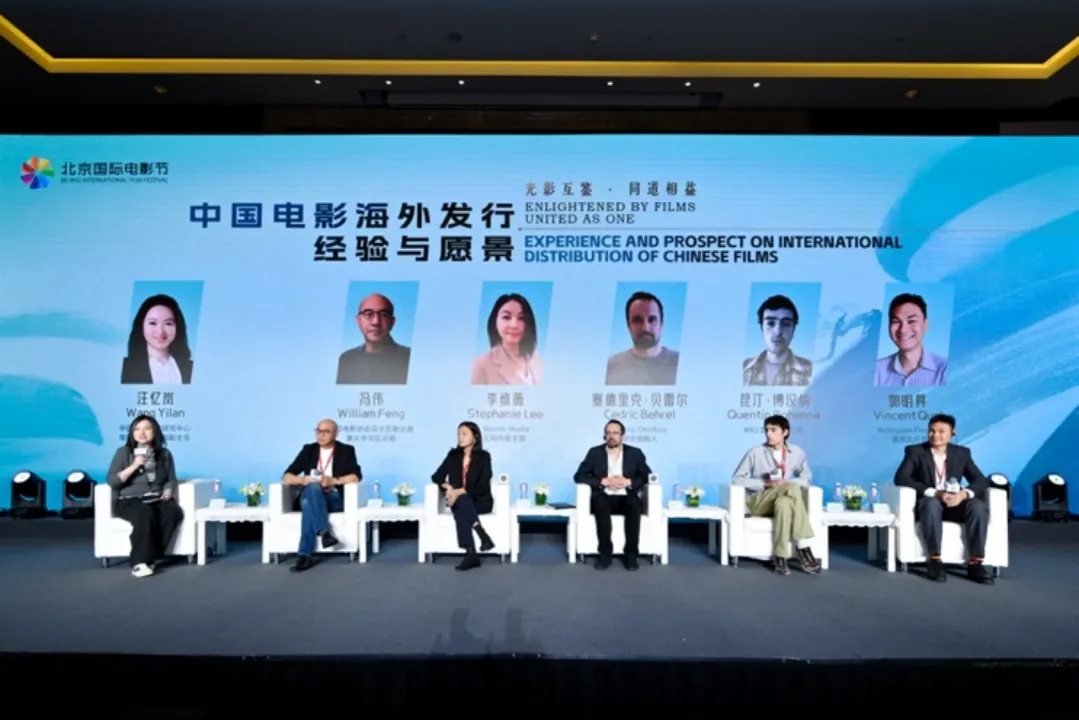The 14th BJIFF International Lounge was officially opened on April 19. The first edition attracted hundreds of Chinese and foreign professionals in the industry.
The International Lounge hosted two forums successfully in the afternoon of April 19. Chinese and foreign panelists were gathered at the Crowne Plaza Beijing Lido to discuss the diversity and inclusiveness of China’s film industry, and ways for Chinese films to go global and fit in the global market.
During the Forum on Experience and Prospect on International Distribution of Chinese Films, five panelists shared cases of overseas distribution of Chinese films from four aspects, namely commercial value, audience, platforms and distribution strategies.
Panelists of the Forum on Experience and Prospect on International Distribution of Chinese Films
In terms of commercial value of Chinese films distributed overseas, Vincent Quek, CEO at Anticipate Pictures Pte. Ltd. indicated that his company has been fully committed to promoting Chinese arthouse films overseas. Regardless of arthouse or commercial films, overseas distribution takes into account the commercial value and target audience of a film. In his view, there are many Chinese films, “we need to be more careful with selection and pick good ones. As a buyer, we must be aware of our needs, and think about what films our target audience are likely to choose”.
When it comes to the target audience of Chinese films overseas, Stephanie Lee, Regional Content Manager at Westec Media Limited, stated that the overseas distribution of Chinese films is growing fast with huge potential. For instance, the hit film Hi, Mom, and other films like Godspeed, Creation of the Gods I: Kingdom of Storms, The Battle at Lake Changjin and Legend of Deification are all outstanding films. “We should seize opportunities and fully consider needs of the target audience in target markets and their level of acceptance for localization to promote Chinese films.”
William Feng, Head of Greater China & Vice President of Asia Pacific, shared his insights into channels and platforms for overseas distribution of Chinese films. According to him, films with heavy Chinese elements, such as Crouching Tiger, Hidden Dragon, Hero and House of Flying Daggers set records of gross box office in North America, which also showed interests in Chinese culture. However, later films didn’t make as impressive results as the aforementioned, probably because overseas audience are aesthetically fatigued with Kung Fu films. He also emphasized, “I think Chinese films can reach the North America market via mainstream distribution platforms or exhibitions, where there are many opportunities worth tapping. Furthermore, distribution should not be limited to theatrical release. There is a gigantic group of subscribers to streaming platforms led by Netflix and Disney+. They are great channels, too.”
When it comes to current overseas distribution strategies, Quentin Bohanna, International Sales Executive at Mk2 Films, explained that it’s necessary to adopt different measures and strategies with different directors so that outstanding Chinese films can be presented to audience worldwide. For instance, he was stunned by the artistic level of director Wei Shujun when watching his film at the Festival de Cannes. “However, given the popularity of the film and conditions on access to international markets, it’s impractical to make large-scale release. So we made the most of promotion at film festivals. We hired an excellent PR team, made impressive posters and hosted screening events, etc.” A different strategy is adopted for director Jia Zhangke. He’s internationally renowned. So we launched presales and decided selection by bidding.
Based on detailed in-depth analysis of the status quo of overseas distribution of Chinese films, the panelists expressed their wishes and expectations about Chinese films going global and reaching more audience. They all believed that Chinese films boast huge potentials in markets worldwide, but it takes specific strategies and fine-tuned efforts in overseas markets to get better results.
First, a fine-tuned measure is to establish distribution fund. Cédric Behrel, Co-founder of Trinity CineAsia, pointed out that, comparatively speaking, film studios in China should enhance their competitiveness, especially exposure overseas. In order to overcome those difficulties, it’s feasible to adopt measures, such as the establishment of distribution fund, to provide support. Second, pay special attention to analysis of target audience. In Vincent Quek’s view, we are living in a connected world. Young people watch and learn about films through social media. It’s ultimately up to the target audience to decide films to choose in such a fiercely competitive environment. Third, remove language barrier. As Stephanie Lee said, “We usually distribute original audio and dubbed versions of Chinese films. But our audience prefer dubbed ones. That tells a lot.” Fourth, focus on globalized content. William Feng pointed out that it’s crucial for Chinese films to present stories about China with globalized narratives in order to go global. “A large group of Chinese directors attended exchange programs in the USA, and gained rich experience in this regard. But screenwriters of Chinese films should be further trained. If they can excel at storytelling in various genres, Chinese films are likely to succeed.” Last but not least, prioritize partnership with media and cinemas. As Quentin Bohanna commented, “Chinese arthouse films need promotion on international media, in particular so when targeting the USA market. For example, they can start trial screenings in a few cinemas, and then expand as per actual situation.”
At the Forum on the Development Opportunities of Chinese Films in Overseas Film Festivals, seven prominent presidents and programmers from influential international film festivals talked about the role of film festival in facilitating the film industry of the country/region, and dived into remarkable performance and new possibilities of Chinese films at international film festivals.

Audience at the Forum on Experience and Prospect on International Distribution of Chinese Films
According to Cameron Bailey, CEO of the Toronto International Film Festival, this year marks the 50th anniversary of the Toronto International Film Festival (TIFF). The TIFF is a public film festival that attracts many filmmaking professionals. As a non-competition film festival, it offers friendly environment, draws on operation of Hollywood productions, and presents outstanding low-budget but beautiful films. As he stated, the TIFF has a professional team of programmers, “my job is to find excellent programmers, and give them the utmost freedom. Outstanding films picked by them are credible. And they help us explore the essence of picked films.”
Hiroyas Ando, Chairman of the Tokyo International Film Festival, thought that the Japanese cinema is rebounding. The box office and audience are off to new upward development. The Tokyo International Film Festival wishes to maximize its international role, and works hard to fulfill foreign visitors. According to him, there were 95 Chinese guests and 12 Chinese films at last Tokyo International Film Festival. Those films are prominent. In particular, Gu Xiaogang’s second film Dwelling by the West Lake is worth mentioning as director Gu Xiaogang was awarded the Kurosawa Akira Award for his exceptional level.
Tiina Lokk, Director of the Tallinn Black Nights Film Festival, explained that the Tallinn Black Nights Film Festival originated from middle 1990s in northern Europe. Its first edition only had 15 foreign participants. She said, “We’ve been focusing on films in northern Europe. Recently, we turned our eyes on the international community. We’ve obtained more copyright licenses of films on geopolitics and relevant subject matters. We aim to produce high-quality films for international audience to enjoy.” She further pointed out that despite small market scale, the film festival is able to reach many international films, casts & crews during the film selection. It’s worth noticing that there is an increasing number of Chinese films in recent editions.
Fernando E. Juan Lima, President of the Mar del Plata International Film Festival, noted that, as one of the most important film festivals in South America, the Mar del Plata International Film Festival intends to stress culture and public engagement, and is a carnival for filmmakers. “We have an international competition section, and prioritize international operation; meanwhile, we attach importance to Argentine elements, and have a large selection of Argentine films. It’s of great significance to our country. We screen both mainstream Hollywood products but also works by independent filmmakers.” He was also excited when talking about his love for The Shadowless Tower by Chinese director Zhang Lu, “it’s beyond words but we can tell it’s a masterpiece. The jury president and we agreed that we liked the film. There are many local elements in the film. Those beautiful Beijing elements are touching. And the message it tries to convey, like the bond between father and son, is shared by the entire mankind.”
Ilda Santiago, Executive Director of the Rio de Janeiro International Film Festival, stated that the BJIFF has always been committed to promoting Chinese films abroad while the Rio de Janeiro International Film Festival is devoted to enabling Brazilian films to go global. We have many things in common, and share the same goal. “I’d rather say ‘recommend’ than ‘pick’ films. I love various cultures and different films. It works better for the promotion of Brazilian films if we seek things in common while reserving differences around the world.” She also noted that, there is a long way ahead, “the Rio de Janeiro International Film Festival will select proper films, and help bring in Chinese films with publicity of the distribution team, and connect with Brazilian audience. We will also invite Chinese filmmakers to Brazil, and learn more about one another. In this way, we are likely to sparkle more chemistry when reaching out to other countries.”
Jacob Wong, Chinese Language Film Programmer for the Berlin International Film Festival and Director of HKIFF Industry of the Hong Kong International Film Festival Society (HKIFFS), believed that the HKIFF plays a crucial role in promoting Chinese films, and it’s the first stop for Chinese films to go global. “For the film industry, we have sections dedicated to Chinese films and young filmmakers. We hosted many forums over the past two decades. And we worked on projects to promote and develop films. We are following up those projects between March and May.” He mentioned, “It’s not just distribution. We want to discover and serve more young filmmakers. Hopefully, we can train young filmmakers through the channel, allow them to access bigger markets, help them with distribution, and grant them opportunities for growth.”
Cui Yan, Executive Deputy Director of the BJIFF Organizing Committee Office, had in-depth conversations with those panelists. In his opinion, despite being a young film festival on the learning curve, the BJIFF tries its best to be inclusive and encompassing with a rich variety of events. The 14th BJIFF Beijing Film Panorama earns a gross box office of RMB14.5 million. At the same time, the BJIFF wishes to cover more aspects, and organizes more than 200 activities and events to fulfill needs of audience at home and abroad, directors, and other stakeholders, such as screenings, competition and forums.
As he stated, “we hope that every segment of the industry may give full play to their role, and seek growth on the platform. Moreover, we will bring more actors, actresses, films and companies to international films festivals.”
At the end of the forum, the BJIFF and Rio de Janeiro International Film Festival signed a Memorandum of Cooperation (MoC) to further expand BJIFF’s network, facilitate win-win and common development of the film and cultural industries in China and Brazil, and create diverse development space and opportunities for Chinese and Brazilian filmmakers.

MoC signing ceremony
Please download the Beijing International Film Festival APP for more interesting content





